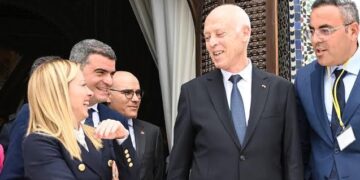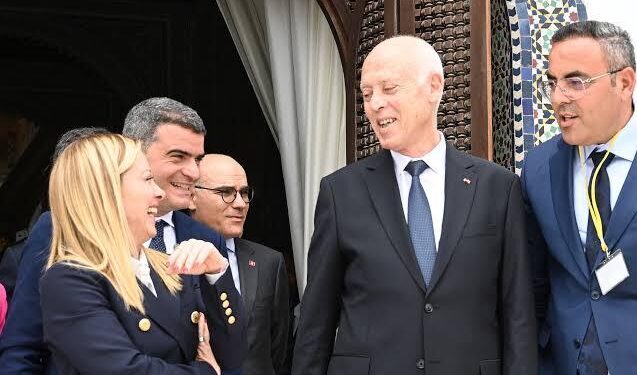By Enyichukwu Enemanna
In an effort to tackle irregular migration from the shores of Tunisia to European countries, European Union leaders on Sunday met with the Tunisian President, Kais Saied, where they pledged for 1 billion euros in financial assistance to Tunisia.
They also pledged more investments in undersea data cables as well as renewable energy in order to restore stability to the North African country.
Saied hosted the leaders of Italy, the Netherlands and the European Commission for talks seeking to secure international financial bailout for his country especially with regards to mitigating incidences of serving as a transit point to Europe.
On the eve of his meeting with EU leaders, Saied made an unannounced visit to a migrant camp in the coastal city of Sfax, a central jumping-off point for boat journeys crossing the Mediterranean to Italy.
He spoke with families living in the camp, and pleaded for international aid for Africans who converge on Tunisia as a transit point to reach Europe.
The President had earlier this year, sparked racist abuse of Black African migrants in Tunisia when he accused them of plots to erase his country’s Arab identity.
The president and Tunisian Prime Minister Najla Bouden met with Italian Premier Giorgia Meloni, Dutch Prime Minister Mark Rutte and European Commission President Ursula von der Leyen.
After the talks, von der Leyen announced a five-point program to support Tunisia, including up to 1.05 billion euros ($1.1 billion in aid for Tunisia’s indebted budget.
The plan will be discussed with all 27 EU countries at their next summit in late June, she said.
In addition to the budgetary aid, the EU is discussing investment in high-speed broadband and other digital infrastructure for Tunisia, and 300 million euros in hydrogen and other renewable energy projects, von der Leyen said.
The plan also includes 100 million euros for Tunisian authorities to carry out search-and-rescue operations for migrants and anti-smuggling operations, she said.
Amid criticism from migrant advocacy groups about forced repatriations, von der Leyen and Rutte insisted the program would respect human rights.
The aim is to “kill that cynical business model of the boat smuggler. Migration is at this moment one of the most important issues facing all of us,” Rutte said.


































